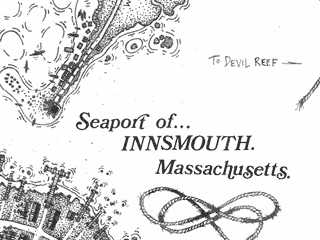As I waded through dozens of recommendations for Anime series (thanks again to everyone who contributed), I began to wonder about a few things. Anime seems to be a pretty vast subject and while I had touched the tip of the iceberg in the past, I really didn’t have a good feel for what was available. So I asked for recommendations, and now I’m on my way. But it’s not like I just realized that I wanted to watch more Anime. I’ve wanted to do that for a little while, but I’ve only recently acted on it. What took so long? Why is it so hard to get started?
This isn’t something that’s limited to deciding what to watch either. I find that just getting started is often the most difficult part of a task (or, at least, the part I seem to get stuck on the most). Sometimes it’s difficult to deal with the novelty of a thing, other times a project seems completely overwhelming. But after I’ve begun, things don’t seem so novel or overwhelming anymore. I occasionally find myself hesitant to start a new book or load up a new video game, but once I do, things flow pretty easily (unless the book or game is a really bad one). I have a bunch of ideas for blog posts that I never get around to attacking, but usually once I start writing, ideas flow much more readily. At work, I’ll sometimes find myself struggling to get started on a task, but once I get past that initial push, I’m fine. Sure, there are excuses for all of these (interruptions, email, and meetings, for instance), but while they are sometimes true obstacles, they often strike me as rationalizations. Just getting started is the problem, but once I get into the flow, it’s easy to keep going.
Joel Spolsky wrote an excellent essay on the subject called Fire and Motion:
Many of my days go like this: (1) get into work (2) check email, read the web, etc. (3) decide that I might as well have lunch before getting to work (4) get back from lunch (5) check email, read the web, etc. (6) finally decide that I’ve got to get started (7) check email, read the web, etc. (8) decide again that I really have to get started (9) launch the damn editor and (10) write code nonstop until I don’t realize that it’s already 7:30 pm.
Somewhere between step 8 and step 9 there seems to be a bug, because I can’t always make it across that chasm.For me, just getting started is the only hard thing. An object at rest tends to remain at rest. There’s something incredible heavy in my brain that is extremely hard to get up to speed, but once it’s rolling at full speed, it takes no effort to keep it going.
It’s an excellent point, and there does seem to be some sort of mental inertia at work here. But why? Why is it so difficult to get started?
When I think about this, I realize that this is a relatively new phenomenon for me. I don’t remember having this sort of difficulty ten years ago. What’s different? Well, I’m ten years older. The conventional wisdom is that it becomes more difficult to learn new things (i.e. to start something new) as you get older. There is some supporting evidence having to do with how the human brain becomes less malleable with time, but I’m not sure that paints the full picture. I think a big part of the problem is that as I got older, my standards rose.
Let me back up for a moment. A few years ago, a friend attempted to teach me how to drive a stick. I’d driven a automatic transmission my whole life up until that point, so the process of learning a manual transmission proved to be a challenging one. The actual mechanics of it are pretty straightforward and easily internalized. Sitting down and actually doing it, though, was another story. Intellectually, I knew what was going on, but it can be a little difficult to overcome muscle memory. I had a lot of trouble at first (and since I haven’t driven a stick since then, I’d probably still have a lot of trouble today) and got extremely frustrated. My friend (who had gone through the same thing herself) laughed at it, making my lack of success even more infuriating. Eventually she explained to me that it wasn’t that I was doing a bad job. It was that I was so used to being able to pick up something new and run with it, that when I had to do something extra challenging that took a little longer to pick up, I became frustrated. In short, I had higher standards for myself than I should have.
I think, perhaps, that’s why it’s difficult to start something new. It’s not that learning has become harder, it’s that I’ve become less tolerant of failure. My standards are higher, and that will sometimes make it hard to start something. This post, for example, has been brewing in my head for a while, but I had trouble getting started. This happens all the time, and I’ve actually got a bunch of ideas for posts stashed away somewhere. I’ve even written about this before, though only in a tangential way:
This weblog has come a long way over the three and a half years since I started it, and at this point, it barely resembles what it used to be. I started out somewhat slowly, just to get an understanding of what this blogging thing was and how to work it (remember, this was almost four years ago and blogs weren’t nearly as common as they are now), but I eventually worked up into posting about once a day, on average. At that time, a post consisted mainly of a link and maybe a summary or some short commentary. Then a funny thing happened, I noticed that my blog was identical to any number of other blogs, and thus wasn’t very compelling. So I got serious about it, and started really seeking out new and unusual things. I tried to shift focus away from the beaten path and started to make more substantial contributions. I think I did well at this, but it couldn’t really last. It was difficult to find the offbeat stuff, even as I poured through massive quantities of blogs, articles and other information (which caused problems of it’s own). I slowed down, eventually falling into an extremely irregular posting schedule on the order of once a month, which I have since attempted to correct, with, I hope, some success. I recently noticed that I have been slumping somewhat, though I’m still technically keeping to my schedule.
Part of the reason I was slumping back then was that my standards were rising again. The problem is that I want what I write to turn out good, and my standards are high (relatively speaking – this is only a blog, after all). So when I sit down to write, I wonder if I’ll actually be able to do the subject justice. At a certain point, though, you just have to pull the trigger and get started. The rest comes naturally. Is this post better than I had imagined? Probably not, but then, if I waited until it was perfect, I’d never post anything (and plus, that sorta defeats the purpose of blogging).
One of the things I’ve noticed since changing my schedule to post at least twice a week is that it forces me to lower my standards a bit, just so that I can get something out on time. Back when I started the one post a week schedule, I found that those posts were getting pretty long. I thought they were pretty good too, but as time went on, I wasn’t able to keep up with my rising expectations. There’s nothing inherently wrong with high expectations, but I’ve found it’s good every now and again to adjust course. Even a well made clock drifts and must be calibrated from time to time, and so we must calibrate ourselves from time to time as well.
Update 3.15.07: It occurs to me that this post is overly-serious and may give you the wrong idea. In the comments, Pete notes that watching Anime is supposed to be fun. I agree wholeheartedly, and I didn’t mean to imply differently. The same goes for blogging – I wrote a decent amount in this post about how blogging is difficult for me, but that’s not really the right way to put it. I enjoy blogging too, that’s why I do it. Sometimes I overthink things, and that’s probably what I was doing in this post, but I think the main point holds. Learning can be impaired by high standards.


